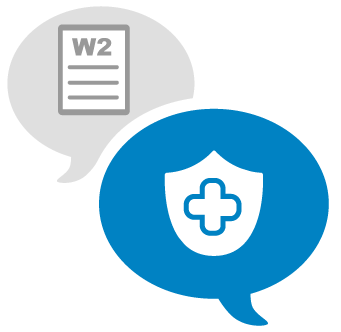In an effort to keep health insurance premiums more affordable, switching policies has become practically an annual event. This is true with many employer-sponsored plans, but you might even make a switch with an individual plan. Chances are, you began 2023 with a new health insurance plan, and you may even do the same for 2024.
What effect will new health insurance mean for your taxes?
It all depends on what type of plan you’ve selected, as well as whether or not you have an employer-sponsored plan or an individual plan.
A New Employer-Sponsored Health Insurance Plan
One of the basic advantages of having an employer-sponsored health insurance plan is that the premiums are typically paid pre-tax, so they reduce your taxable income. For example, if you earned $50,000 in salary from your employer and contributed $5,000 toward your health insurance premium, your income for federal tax purposes will be reduced to $45,000.
If you’re in the 12% tax bracket for 2023, this will result in a $600 reduction in your federal income tax. That doesn’t come close to offsetting the cost of your contribution, but it gives you some tax relief.
With most plans, the employer pays part of the premium. That portion of the premium will have no tax consequences for the employee either way.
A New Individual Health Insurance Plan
If your employer doesn’t provide a health insurance plan, you can get coverage either on your state health insurance exchange or on healthcare.gov by the December 15 open enrollment deadline.
If you have to go this route, there are two ways you may get a tax break.
Health insurance premium tax credit: If you purchase health insurance in your state marketplaces or healthcare.gov, you could get the premium tax credit (PTC) to help you pay for health insurance. There are a series of eligibility criteria but the main one is based on your income. To be eligible, your household income must be at least 100% but not more than 400% of the federal poverty level.
Claim the premiums as an itemized deduction: To the extent your premiums exceed 7.5% of your adjusted gross income, you can claim them as an itemized deduction. For example, if your adjusted gross income for 2023 is $100,000, and you paid $20,000 in health insurance premiums, you’ll be able to deduct $12,500 of that amount. That’s calculated by $20,000 – ($100,000 X 7.5%).
However, for 2023, the standard deduction was increased to $13,850 for single filers and $27,700 for those married filing jointly.
If you are self-employed you can deduct your health insurance premiums paid, and you don’t have to itemize your deductions or be subject to the 7.5% requirement.
Impact of a Health Savings Account (HSA)
You may be considering a Health Savings Account, given that health insurance deductibles have increased in recent years. They can partially offset the health insurance premium cost. A typical deductible is several thousand dollars, whether on an employer-sponsored plan or an individual health insurance plan. An HSA can help you build up cash reserves to cover a high deductible and you get a tax break on your contributions.
For 2023, you can contribute up to $3,850 for yourself or $7,750 if you have coverage for your family. At age 55 and older, individuals can contribute an additional $1,000.
There are also specific limits on both the deductibles and out-of-pocket maximums on your basic health insurance. HSAs are an excellent way to balance higher deductibles and out-of-pocket costs with a reduced-cost basic health insurance premium.
Generally, unspent funds can remain in a HSA from one year to another. HSA funds can pay for things like deductibles, copayments, and other health care costs.
Don’t worry about knowing the tax implications of moving to a new state — TurboTax will ask you simple questions about you and give you the tax deductions and credits you’re eligible for based on your entries.
If you have questions, you can connect live to a TurboTax Live tax expert with an average 12 years experience from the comfort of your home to get your tax questions answered. Meet with a TurboTax Full Service expert who can prepare, sign and file your taxes, so you can be 100% confident your taxes are done right. Start TurboTax Live Full Service today, in English or Spanish, and get your taxes done and off your mind.
One response to “What Does My New Health Insurance Mean for My Taxes?”















